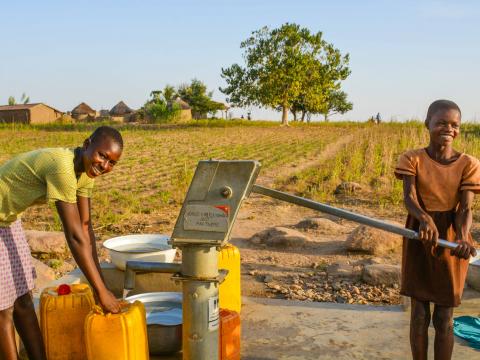World Vision Ghana Statement on World Water Day

Every Child Deserves Clean Water!
(Time to Walk the Talk)
Accra, Sunday 22 March, 2020
“The poor and needy search for water, but there is none; their tongues are parched with thirst. But I the LORD will answer them; I, the God of Israel, will not forsake them” Isaiah 41: 17 (NIV)
The global need
Access to clean water, dignified sanitation and appropriate hygiene is fundamental to socio-economic development and the well-being of vulnerable children, their families and communities.
Unfortunately, one in three people in the world lives in a country with limited access to clean water. It is estimated that by 2030, nearly half the global population could experience water scarcity, with demand outstripping supply by about 40 percent.
The water situation in Ghana
While we recognize government’s effort at increasing access to this precious resource, we note with dissatisfaction that, over 6 million people in Ghana still lack access to safe water. Women and children still travel long distances in search of non-existent clean water, while many schools and healthcare facilities lack sustainable access to clean water and dignified sanitation. This has negative implications for maternal and child health, learning, nutritional outcomes, productivity and the general well-being of children and their families.
World Vision
For believers in a better world for children, World Vision lives and works with communities to co-create solutions that last. We believe that nothing can be more important to child wellbeing than access to safe water. This is why we have made substantial investments in people and equipment to become the largest non-governmental provider of clean water in the developing world, reaching a new person with safe water every 10 seconds.
Our call to Action
On the occasion of World Water Day 2020, World Vision joins practitioners in safe water delivery and indeed all Ghanaians, in calling on the Government of Ghana to do the following:
- Prioritize and increase investments towards universal access to safe water
We are concerned that the current levels of investment in safe water does not match the ever-increasing demand, and if current trends continue, we may not address the shortfall anytime soon.
It is worrying that at a time Ghanaians needed water the most to practice appropriate handwashing as a means to combat the spread of the deadly COVID-19 pandemic, there are widespread water shortages across the country resulting in acute rationing.
We urge all Ghanaians to make judicious use of water at this time, ensure strict self-discipline, adhere to prescribed social distancing and practice enhanced hygiene (handwashing with soap under running water, use of alcohol-based sanitizers, avoiding handshakes and all forms of body contact) as a preventive measure to contain the disease.
- Take immediate steps to address water quality challenges
The Multiple Indicator Cluster Survey (2017/18) indicates that close to eight in every ten households had E-coli (faecal contamination) in their drinking water, while close to half of water sources were affected. While the microbial contamination remains a major area of concern, a recent study conducted in collaboration with the University of North Carolina also reveals the importance of enhanced focus on trace metal contamination of boreholes.
The National Drinking Water Quality Framework (NDWQF) and Water Safety Planning need to be fully implemented to assure citizens of their health and safety.
- Address the regional disparities in access to safe water, paying special attention to areas with access below the national average
It is quite problematic that while access to basic drinking water in Greater Accra is 98%, it is only 50% in Northern Region (MICS 2017/18). The Upper East, Upper West, Western and Eastern Regions are also below the national average in terms of access to safe water.
- Bridge the inequalities in basic water access
There is a clear wealth disparity in basic water access, with the wealthy nearly twice as likely to have access than the poor. Additionally, urban dwellers are more likely to have basic access than those in rural areas (MICS 2017/18).
- Arrest the effects of climate change and the wanton pollution of water bodies on sustainable access to safe drinking water
Government should have the will to take bold and decisive steps to ensure that we win the fight against illegal mining (Galamsey) in order to preserve our sources of water and promote increased access.
Our pledge
World Vision Ghana is committed to prioritizing, increasing investments and partnering with Government, Development Partners, private sector, NGOs and other stakeholders to ensure that every child everywhere and their families have access to clean water.
Our vision for every child, life in all its fullness; our prayer for every heart, the will to make it so.
For further information, please contact:
Attah Arhin | WASH Technical Coordinator | World Vision Ghana | 024 471 3332
Email: attah_arhin@wvi.org
Washington Nuworkpor | Communications Manager | World Vision Ghana | 020 817 0286
Email: Washington_nuworkpor@wvi.org